Did you know that some countries see belching as a compliment to the chef? And that's just one of many "rude" manners that are actually considered polite in other cultures.

14 Rude Manners That Are Actually Polite in Other Countries


Burping at the dinner table
Without further ado, we will answer the pressing question about table manners that we posed above: Where is burping a compliment? As it turns out, there are several countries where folks see belching as a compliment. These include China, Taiwan, Turkey, Egypt and some Middle Eastern countries, according to Goss. And if you do so within earshot of your host, particularly in China and Taiwan, you’ll be making it extra clear to them that you found what they served to be delicious and satisfying, adds Napier-Fitzpatrick.
That said, etiquette expert Jacqueline Whitmore says there’s a bit more nuance here. Burping aloud, she explains, is more of a way to let the entire table know you are now happy and well fed versus a way to compliment the chef directly. Letting the chef know that you enjoyed your meal is still the way to convey that idea.

Slurping noodles
In the United States, there’s a right way and a wrong way to eat noodles. And slurping them is not the right way. Actually, that’s true almost anywhere, with a few notable exceptions. “Slurping noodles is not only acceptable in Japan but is also a sign of appreciation,” Goss says. Giving your noodles a big slurp says that you’re happy with your udon, ramen, shirataki or whatever other noodle your host happens to be serving. The only downside, Goss notes, is that slurping can get messy.
You may have also heard the phrase “burp and slurp,” leading you to believe you should follow up that slurp with a hearty, uninhibited belch. Don’t do it! That pairing isn’t considered polite in Japan or anywhere else, so it’s always a no-no.

Arriving late to a dinner party
In the United States, lateness is frowned upon, especially when it comes to showing up to dinner parties. After all, the host has given you a time, and the food might get cold if you’re late. That is not the case in Argentina, Brazil, Mexico and France. In these countries, arriving late to your dinner-party host’s door is not merely polite—it’s expected. “When you arrive on time, you run the risk of interrupting your host doing last-minute preparations,” Goss explains.
And definitely don’t arrive early, especially in France! That’s considered rude, says Whitmore. What’s polite? For informal dinners, it is customary to arrive 10 to 30 minutes late. In some cases, especially for larger gatherings or casual events, arriving even later (up to 45 minutes) may be acceptable. If you are invited to a formal dinner, punctuality is more important. However, arriving just a few minutes late (around 5 to 10 minutes) is typically tolerated.
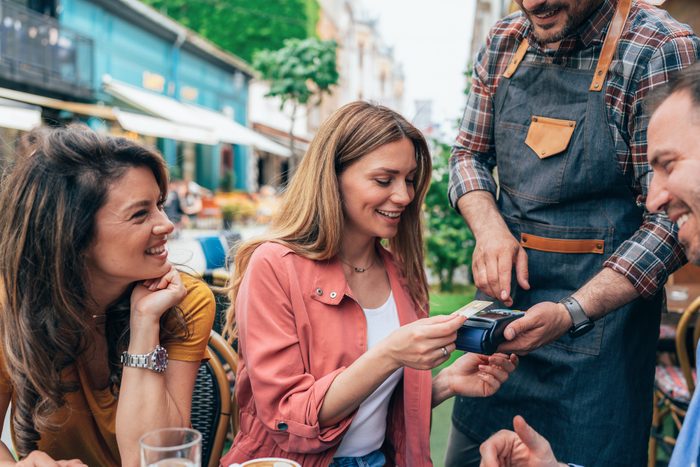
Not offering to split the bill
In the United States, there’s a whole complicated rubric for deciding who should pick up the tab at a restaurant. The one exception involves dining with a group of friends, where splitting the bill is the socially appropriate choice. In France, however, it is generally considered rude to split the bill. French dining culture typically involves taking turns treating one another.
And in Greece, if you’re in a more traditional setting or dining with family, it is common for the host (often the oldest or most senior person at the table) to pay for the meal. If you’re with close friends, they may insist on treating you as a gesture of hospitality.

Chugging wine
Chugging alcohol may be “acceptable” in the United States, but only under certain circumstances. Aside from the frat parties that probably come to mind, it’s also OK to down an entire shot of hard alcohol. Sipping something like that would be weird, of course, just like chugging champagne or wine would be equally strange. But there is one country where chugging wine may be the right thing to do, according to Goss: In the Republic of Georgia, it’s a time-honored tradition to chug wine after someone makes a toast.
Although it’s unclear exactly how the tradition began, it may have something to do with the fact that people in Georgia used to drink wine from animal horns. And let’s face it—there’s no good way to sip from an animal horn, at least without wasting a lot of whatever it is you’re drinking. In any event, if you find yourself at a Georgian celebration, says Goss, “get ready because you will be expected to down your glass in one fell swoop. So take a deep breath, and enjoy!”
One caveat: In everyday settings, sipping your drink is still the way to go. Reserve the chugging for celebratory events, not everyday get-togethers.
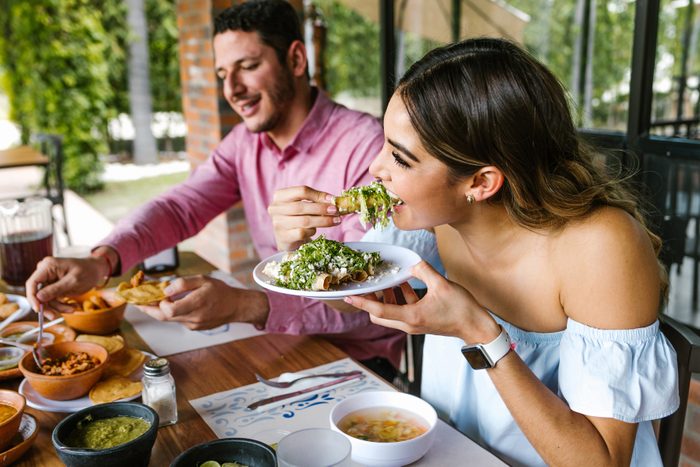
Eating with your hands
While you should feel free to eat any of these foods with your hands, the same is not true across the (charcuterie) board, at least not in the United States. But in some countries, eating with your hands is not only acceptable—it’s customary. In Ethiopia, for example, you’ll be hard-pressed to find any cutlery at all on most tables, and you certainly shouldn’t expect it, says Goss. Rather, you’ll be served a spongey-textured flatbread known as injera, and you will be expected to tear off small pieces and use them to scoop up whatever else is being served.

Deflecting a compliment
In the United States, a compliment is considered a gift. As with any gift, a person is expected to say “thank you” after receiving one. In other countries, however, “compliments can be tricky,” according to Goss. In Japan, for example, as well as some other East Asian cultures, a great deal of importance is placed on modesty. Accordingly, accepting a compliment could be seen as boastful. Instead, the polite thing to do is to deflect the compliment, whether by refuting it or giving credit to someone or something else.
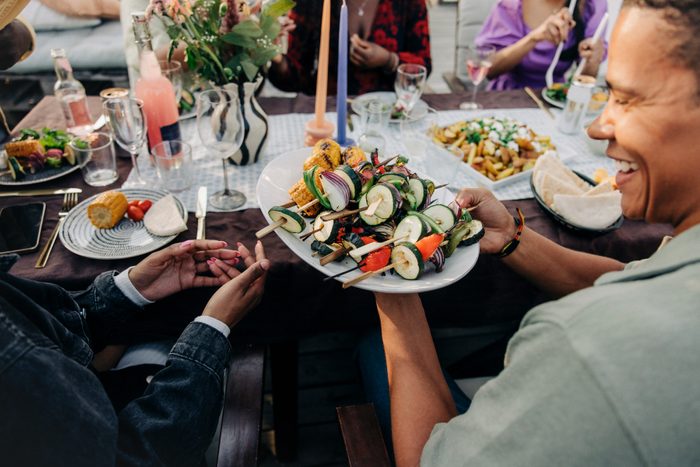
Passing food and drinks to the left
Etiquette rules evolve, but the tradition of passing food and drinks to the right in the United States has remained fairly static over time—so much so that it probably wasn’t definitively taught to you but was something you observed, inferred and just started doing on your own. But when traveling in the U.K., the opposite is true: You should pass food to the left, in a counterclockwise direction. That’s due to the royal naval tradition of always keeping one’s “sword arm” free. This, of course, presumes that the sword is always carried in one’s right hand (and that you’re carrying a sword). All that said, not all Brits follow this tradition.

Eating food that has fallen on the ground
Yes, many of us abide by the five-second rule, but if it’s any longer than that—or if you really don’t trust the ground it’s dropped on—it’s going in the trash. But in Islamic countries, it is generally considered wasteful to discard food that’s fallen on the ground. “Instead, it is recommended to eat food that has fallen to the ground, but only after ensuring that [the surface] is clean,” Goss says. “This shows gratitude for your blessings and avoids wastefulness.”

Haggling in a retail setting
In the United States, you are pretty much expected to haggle for the best price on major purchases such as homes and automobiles. Some household bills are negotiable as well. But bargaining for everyday retail items? That would be seen as odd, if not flat-out rude. By contrast, in a number of countries around the world, “haggling to purchase everyday items is perfectly acceptable, especially in markets, bazaars and informal settings,” notes Goss.
In fact, haggling is considered so commonplace in Turkey, Egypt and Iran that sellers may inflate the prices as a starting point by as much as 30% to 50%! (That’s definitely something for tourists to keep in mind.) Bargaining is also a common and integral part of the shopping culture in China, Mexico and Colombia, according to Goss.
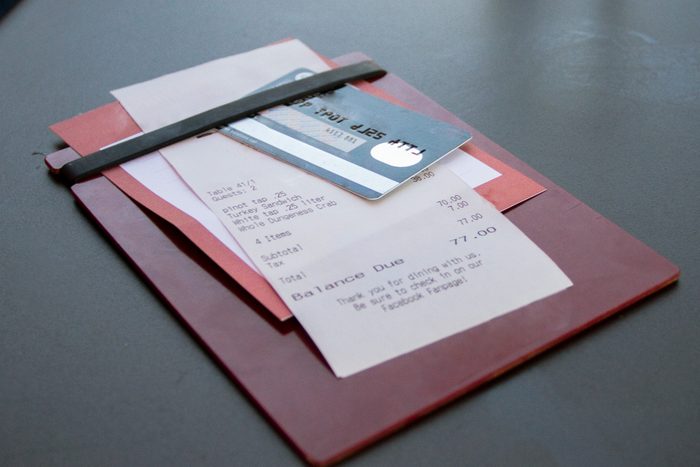
Not tipping
Tipping has always been appreciated, if not expected, in many contexts throughout the United States. Would you ever think of not tipping a waiter or your hairdresser? Nope! It’s a breach of basic etiquette. But the emphasis on tipping is a uniquely American custom, says Goss. In fact, in some countries, tipping is seen as rude. That is true in Japan, where Goss warns that tipping is considered insulting because the Japanese pride themselves on their level of service. When you offer a tip to someone after they’ve served you, you’re questioning their work ethic and suggesting that they needed to be bribed in order to provide good service. In these cultures, giving good service is seen as its own reward. And in China, where burping is a compliment, as you will recall, tipping is not. Indeed, tipping can be seen as rude or even embarrassing.
That said, in some other countries, including France, Greece and Australia, tipping is not necessarily expected, but it’s not taken as an insult.

Not making eye contact
Eye contact is a major facet of decoding body language in the United States, where steady eye-to-eye gazing is considered “a big part of ‘showing up well,'” according to Goss. But making direct eye contact is considered rude in many other places, including in Japan, South Korea, China and Malaysia. In these countries, attempting eye contact it can be read as disrespectful and aggressive, if not downright confrontational, especially with elders or authority figures. “Indirect glances are preferred to demonstrate humility and respect in these cultures,” Goss says. “Check your protocols before traveling to avoid misunderstandings with visual contact.”
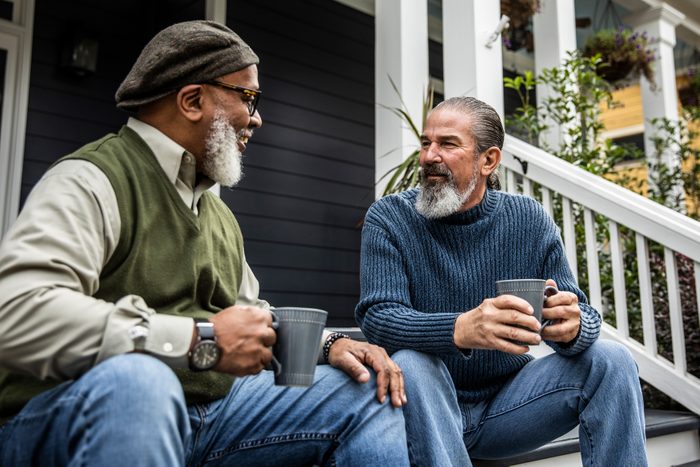
Pausing significantly during a conversation
“Silence is golden” is just one of the many truisms that may not literally be true in the United States. “In this country, people tend to be uncomfortable with silences beyond a second or two,” says Goss. In other countries, however, folks tend to be more comfortable with longer silences in conversations. In fact, the pauses themselves are often regarded as an important part of the conversation.
In Scandinavia and parts of Asia and Africa, a “thoughtful” pause might convey deep understanding in a way that the words “I get it” might not. And a particularly long pause after one speaker finishes a thought can mean “I’m fully engaged. You have my complete attention.” Indeed, to respond without a pause essentially requires you to be thinking about your answer before the other person has finished speaking … which means you’re not really listening. A pause, by contrast, conveys that you waited for them to finish before figuring out what to say next.

Not giving at least an arm’s length of personal space
“Don’t stand so close to me,” said the Police in their famous ’80s song. But the definition of “so close” can vary across cultures. In the United States, for example, appropriate personal space is regarded as no less than arm’s length. The same is true in England. But people in other countries tolerate far less personal space without feeling unduly encroached upon.
“In Latin American cultures, and especially in Argentina and Brazil, standing close to one another while interacting is a loving gesture,” Goss tells Reader’s Digest. In fact, when conversing with a loved one or even an acquaintance, it would be considered rude to stand more than an arm’s length away.
About the experts
|
Why trust us
Reader’s Digest has published hundreds of etiquette stories that help readers navigate communication in a changing world. We regularly cover topics such as the best messages to send for any occasion, polite habits that aren’t as polite as they seem, email and texting etiquette, business etiquette, tipping etiquette, travel etiquette and more. We’re committed to producing high-quality content by writers with expertise and experience in their field in consultation with relevant, qualified experts. We rely on reputable primary sources, including government and professional organizations and academic institutions as well as our writers’ personal experience where appropriate. For this piece on where burping is a compliment and other rude manners that are polite elsewhere, Lauren Cahn tapped her experience as a journalist who covers knowledge and history for Reader’s Digest. Then Jacqueline Whitmore, a business etiquette expert and hospitality consultant with more than 30 years of experience who owns the Protocol School of Palm Beach, gave it a rigorous review to ensure that all information is accurate and offers the best possible advice to readers. Read more about our team, our contributors and our editorial policies.
Sources:
- Jan Goss, founder of Show Up Well Consulting and author of Protocol Power; email interview, Aug. 10 and Aug. 12, 2024
- Patricia Napier-Fitzpatrick, founder of the Etiquette School of New York; email interview, 2019
- Jacqueline Whitmore, founder of the Protocol School of Palm Beach; email interview, November 2024
- Discover: “It’s Not Rude—Slurping Makes Food Taste Better”
- Babbel: “Is It Appropriate to Burp in Other Countries?”
- CNN Travel: “15 international food etiquette rules that might surprise you”
- India Shine: “12 Reasons Why Indians Eat with Their Hands”




















